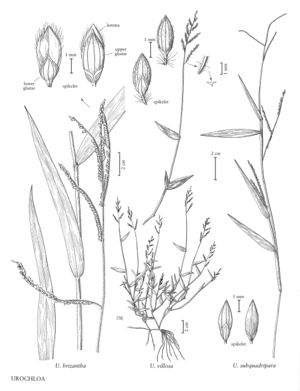Difference between revisions of "Urochloa villosa"
FNA>Volume Importer |
imported>Volume Importer |
||
| (8 intermediate revisions by 2 users not shown) | |||
| Line 7: | Line 7: | ||
|synonyms={{Treatment/ID/Synonym | |synonyms={{Treatment/ID/Synonym | ||
|name=Brachiaria distichophylla | |name=Brachiaria distichophylla | ||
| − | |authority= | + | |authority= |
| + | |rank=species | ||
}} | }} | ||
|hierarchy=Poaceae;Poaceae subfam. Panicoideae;Poaceae tribe Paniceae;Urochloa;Urochloa villosa | |hierarchy=Poaceae;Poaceae subfam. Panicoideae;Poaceae tribe Paniceae;Urochloa;Urochloa villosa | ||
| Line 20: | Line 21: | ||
-->{{Treatment/Body | -->{{Treatment/Body | ||
|distribution=Md. | |distribution=Md. | ||
| − | |discussion=<p>Urochloa villosa is a tropical African and Asian species that Reed (1964) reported collecting from chrome and iron ore piles in Newport News, Virginia in 1959. His voucher specimens, acquired by the Missouri Botanical Garden in 2001, were not available for examination prior to publication of this volume, so the description is from Veldkamp (1996) and Clayton and Renvoize (1982). No additional collections have been reported in the Flora area.</p> | + | |discussion=<p><i>Urochloa villosa</i> is a tropical African and Asian species that Reed (1964) reported collecting from chrome and iron ore piles in Newport News, Virginia in 1959. His voucher specimens, acquired by the Missouri Botanical Garden in 2001, were not available for examination prior to publication of this volume, so the description is from Veldkamp (1996) and Clayton and Renvoize (1982). No additional collections have been reported in the Flora area.</p> |
|tables= | |tables= | ||
|references= | |references= | ||
| Line 29: | Line 30: | ||
-->{{#Taxon: | -->{{#Taxon: | ||
name=Urochloa villosa | name=Urochloa villosa | ||
| − | |||
|authority=(Lam.) T.Q. Nguyen | |authority=(Lam.) T.Q. Nguyen | ||
|rank=species | |rank=species | ||
| Line 36: | Line 36: | ||
|basionyms= | |basionyms= | ||
|family=Poaceae | |family=Poaceae | ||
| + | |illustrator=Linda A. Vorobik;Cindy Roché | ||
| + | |illustration copyright=Utah State University | ||
|distribution=Md. | |distribution=Md. | ||
|reference=None | |reference=None | ||
| Line 41: | Line 43: | ||
|publication year= | |publication year= | ||
|special status= | |special status= | ||
| − | |source xml=https:// | + | |source xml=https://bitbucket.org/aafc-mbb/fna-data-curation/src/200273ad09963decb8fc72550212de541d86569d/coarse_grained_fna_xml/V25/V25_1326.xml |
|subfamily=Poaceae subfam. Panicoideae | |subfamily=Poaceae subfam. Panicoideae | ||
|tribe=Poaceae tribe Paniceae | |tribe=Poaceae tribe Paniceae | ||
Latest revision as of 17:56, 11 May 2021
Plants annual; loosely tufted or sprawling. Culms 7-50 cm, geniculate, decumbent to prostrate at the base, often much-branched below, usually rooting at the nodes; nodes pubescent; Sheaths usually pubescent, sometimes densely so, rarely glabrous, margins ciliate; ligules 0.3-1.1 mm, blades 1-7 cm long, 2-9.3 mm wide; usually densely puberulous on both sides, margins basally ciliate or scabrous. Panicles (1.5)4.5-8 cm long, with 4-12 spikelike primary branches in 2 ranks; primary branches 0.7-3.3 cm, axes 0.2-0.3 mm wide, triquetrous, pubescent; secondary branches rarely present, pedicels shorter than the spikelets. Spikelets 2-2.8 mm, solitary (or paired), in 1 row, appressed to the branch axes. Glumes separated by about 0.3 mm; lower glumes 0.7-1.5 mm, 1/3 – 1/2 as long as the spikelets, 3-veined; upper glumes glabrous or pubescent; 5-veined, lower florets sterile; lower lemmas similar to the upper glumes; lower paleas present; upper lemmas 1.8-2.1 mm, granulose to rugulose, acute, mucronate; anthers 0.9-1.3 mm. 2n = 36.
Discussion
Urochloa villosa is a tropical African and Asian species that Reed (1964) reported collecting from chrome and iron ore piles in Newport News, Virginia in 1959. His voucher specimens, acquired by the Missouri Botanical Garden in 2001, were not available for examination prior to publication of this volume, so the description is from Veldkamp (1996) and Clayton and Renvoize (1982). No additional collections have been reported in the Flora area.
Selected References
None.
